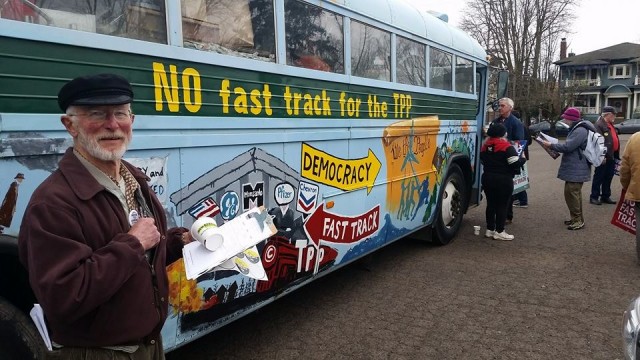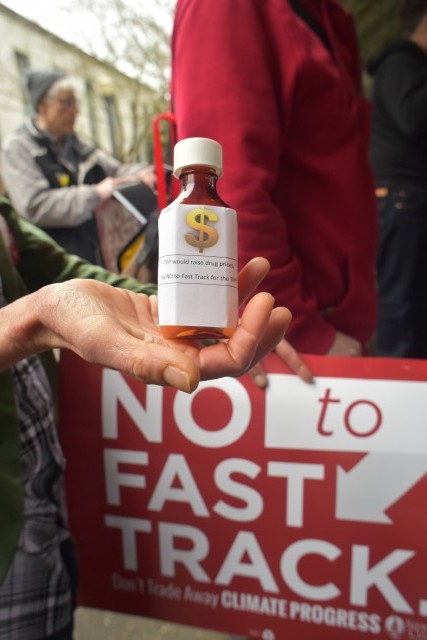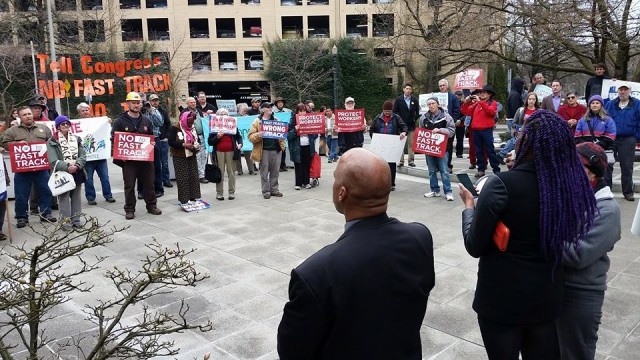Story by Pete Shaw
More than 50 activists visited the offices of Congressman Earl Blumenauer and Senator Ron Wyden to demand the men vote against giving President Obama the Fast Track Authority he likely needs to gain passage of the Trans Pacific Partnership (TPP).
A so-called free trade agreement (FTA) between 12 countries in the Pacific Rim that produce over 40% of the world’s gross domestic product, the TPP, if passed, would dwarf prior FTAs such as the North American Free Trade Agreement (NAFTA) and the Central American Free Trade Agreement (CAFTA).
Like NAFTA and CAFTA, the TPP has very little to do with free trade. Instead, at least from leaked documents (negotiations have been held in secret) it is clear that the TPP will break down the sovereignty of nations and smooth the way for multinational corporations to make greater profits. The secrecy of the discussions around the TPP—so furtive that not even members of Congress know what is being bandied about—has become something of a necessity due to the general lack of public support for FTAs.
According to Public Citizen’s Lori Wallach, NAFTA has resulted in a net loss of 1 million US jobs, as well as decreased wages, increased inequality, and environmental degradation and destruction. Elizabeth Swager of the Oregon Fair Trade Campaign (ORFTC), says over 75,000 jobs have been lost since 1994, the year NAFTA became law.
“The trade agreements such as the WTO (World Trade Organization), NAFTA, the FTAA (Free Trade Area of the Americas), and yes, the TPP, are all immoral,” said Kate Lore, Social Justice Minister at the First Unitarian Church. “Why? Because only a few people are benefitting from them—the ones doing the buying and selling of goods, services, and intellectual property rights. The ones getting rich. Everyone else—the workers, the people in need of inexpensive medicine, the planet—pays the price. In other words, the TPP—like all its free trade cousins—places a priority on amassing wealth for the 1% while everyone else suffers.”
There is much not to like in the TPP. That is why Fast Track is so important to President Obama. With it, passage of the TPP becomes much more likely; however, in accepting Fast Track, the Congress would be abdicating its Constitutional mandate to regulate trade. For instance, when the TPP came before Congress, senators and representatives would have little time to debate it or offer amendments. They could only vote for or against it. In moving along so quickly, the public would have almost no chance to find out what is in the TPP.
One way the TPP would benefit corporations over the will of citizens would be by allowing corporations the right to sue governments if those governments pass laws that result in future lost profits. For example, if the people of the United States apply enough pressure to their representatives and force them to not allow TransCanada Corporation to ship tar sands oil from Alberta, Canada through the US via the Keystone XL pipeline, TransCanada could sue the US for its lost profits.
Speaking outside of Blumenauer’s office building, Joe Salas, Field Director of Friends of the Earth Action, told the crowd, “Do not be fooled. The TPP has little to do with free trade and everything to do with gutting environmental standards. These deals are being drafted by lobbyists from big agribusiness, chemical giants, and pesticide companies.”
During the week prior to the rally, Salas said Friends of the Earth Action knocked on over 2,000 doors in Blumenauer’s district. He also noted that hundreds of Friends of the Earth Action members phoned Blumenauer’s offices, urging him to vote against Fast Track and the TPP.
“It is about more than good government, as important as that is,” said Salas. “It’s about the kind of world we live in—the kind of world we want to pass on to our children and their children. We know that protecting our planet, protecting people and protecting our way of life and our lives depends on us demanding that our lawmakers stand up for us.”
In November 2013 Wikileaks released the Intellectual Property Rights Chapter of the TPP. Among its contents, it makes clear that the big pharmaceutical companies believe people have no right to generic medications. The TPP would allow for “evergreening,” which would let pharmaceutical companies extent patents on drugs with only minor tweaks to the medicine, regardless of the therapeutic value of those changes. Generic drugs are much cheaper than name-brand medicines and thus make their therapies available to people who could not otherwise afford them.
Joe Freeman, a member of the American Medical Student Association’s AIDS Advocacy Network who works with Doctors without Borders and HealthGap, addressed the crowd outside of Wyden’s office building. “Before going to medical school, I worked as a pharmacist here in the US and for a couple of years in Africa,” he said. “So I have seen international medicine at its best and big pharma at its worst. As a future physician and a current Oregon voter, I am frightened by these secret discussions of policy that will affect millions of people without a public debate. Treatment of HIV is lifesaving, it’s economy growing, and it is the best way to prevent further infections here and abroad. The secretly negotiated TPP threatens to undermine decades of public health work just as we are turning a corner on this pandemic.”
Pointing out that the leaked TPP documents show an allowance for extending patents for existing medicines “well beyond the already long standard of 20 years” Freeman noted that the TPP will not bring down drug prices in the US, but will raise prices in the countries that can least afford the increase. “Drug manufacturers are already highly profitable. They don’t need stronger patents. What drug companies, trade negotiators, and senators need are stronger ethics.”
The most interesting speech at the rally came from Adrienne Cabouet of Black Lives Matter Portland. While economic issues are of concern to all working people, Black people and other people of color continually face the harshest conditions during both downturns and more prosperous times. Economic and race issues are inextricably intertwined, and throughout history labor has hurt itself by ignoring this, as well as buttressing the ruling class by dividing itself along race lines.
As Cabouet told the crowd, the unemployment rate for Black people in the US is twice that of white people, Black college graduates are less likely to be hired for jobs than white ex-convicts, 24% of Black people live in poverty, and Black people hold just 3% of the country’s wealth while white people possess 88% of it. Any movement tackling economic issues must take these and other similarly grim statistics into account and include forms of restorative economic and social justice.
“When we talk about the effects that the Trans Pacific Partnership will have on our economy,” Cabouet told the crowd, “it’s not difficult to determine which segment of the population will be hit the hardest. When manufacturing and service sector jobs are sent overseas by the thousands, families of color disproportionately suffer the negative effects.”
“The overwhelming racial disparities present within our job market and economy,” Cabouet continued, “can not be solely attributed to NAFTA style trade agreements and the TPP. Today we are living with the end results of decades upon decades of institutional racism, ingrained into every segment of our state and government. It is only because we allowed these disparities to fester–because we allowed our culture to be built upon a virulent strain of anti-black racism and white supremacy–that the impact that these trade agreements have upon communities of color is so devastating.”
Cabouet’s passionate critique is one that has been missing from much of the talk surrounding TPP resistance. Much as the Black Lives Matter Movement has forced white people to consider the role police play in violently oppressing Black people, FTAs have also forced white people to reassess their belief that their politicians work for them and that US corporations have their well-being in mind. As a part of that understanding white people must also be vigilant to craft solutions that take into consideration the different experiences of people of color and the welfare of all citizens.
“Your fight against the TPP is our fight too. And our fight, the fight for Black and Brown lives, is yours,” said Cabouet. “If our government has shown us anything, it’s that it will willfully defy the wishes of its own people in the name of deregulation and corporate interests. There will always be another NAFTA. There will always be another TPP. Winning the fight against these trade agreements depends on the people of this country, of all colors and all causes, uniting and standing together in the fight against oppression. We can not allow the state sanctioned oppression of an entire people–of any people–to continue within our country. Our fight must be your fight and your fight must be ours. Not a single one of us is free until all of us are free.”
A vote is looming on Fast Track. Senate Finance Committee Chair Orrin Hatch wants Wyden—the top ranking Democrat on the committee—to vote for it. Though Wyden has historically shown love for FTAs, regardless of their devastating results, he has had a very hard time making the commitment to Fast Track. Last January, he did not support Fast Track legislation brought forward by Hatch due to pressure from his constituents..
Soon, Wyden began talking about something he was calling Smart Track, which never materialized and appeared to be Fast Track with a different name. After Republicans gained control of the Senate in November, Wyden indicated he would support Fast Track, offering some tepid amendments that would have little effect on the substance of the TPP and other FTAs that might come up under it. People again responded, and again it seems Wyden is feeling the heat, saying recently that Hatch’s call for a hearing on trade this Thursday, February 26—a move seen as an attempt to pressure Wyden to sign on to Fast Track legislation—is “premature.”
Wyden is up for re-election next year. Between Republicans having been competitive in statewide races in recent years and a poll conducted by Public Policy Polling on behalf of Democracy for America that shows half of all Oregon voters would be less likely to vote for Wyden’s re-election if he votes for Fast Track and the TPP, Wyden is perhaps realizing that he does not have much wiggle room. It is never good to go into election with the public sentiment being that you are a destroyer of jobs.
While this is not yet a victory for working people, the pressure they are putting on Wyden appears to be working. The organizing around this issue, particularly by the Oregon Fair Trade Campaign, has been impressive. A wide swathe of groups has come together in an attempt to force Wyden and Blumenauer to oppose Fast Track and the TPP despite their clear desire to pass both.
“Senator Wyden is the highest-ranking Democratic Senator when it comes to overseeing US trade policy, and Congressman Blumenauer sits on the House Trade Subcommittee, so they both have the ability to push for trade agreements that reflect Oregon values,” said Elizabeth Swager of the ORFTC. “Approving Fast Track for the TPP would mean giving away their authority on trade. It would be a total abandonment of their responsibilities to their constituents.”
Want to get involved? Call Senator Wyden at (503) 326-7525 and Representative Blumenauer at (503) 231-2300 to urge them to oppose Fast Track and the Trans Pacific Partnership.
Follow up your phone call with an email to Senator Wyden by going to: http://org.salsalabs.com/o/1034/p/dia/action3/common/public/?action_KEY=17225
For more information, go to:http://www.citizenstrade.org/ctc/ and http://www.citizenstrade.org/ctc/oregon/









